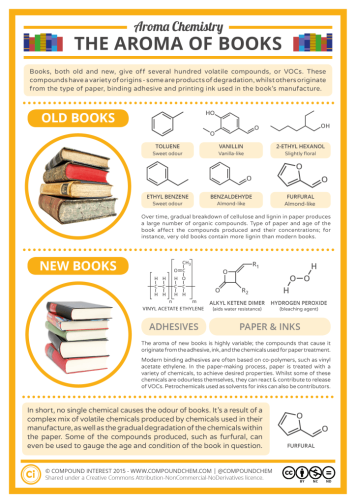By: Kristen Joseph
Okay, I think it’s about time for someone to ask these questions…. What’s up with book sniffing? What on earth even makes books smell like that? And why isn’t there an official term for this particular action? As a fellow book-lover (who enjoys the smell of a good tome on occasion), I decided to research this topic to satisfy my curiosity, and yours.
 Old books and new books seem to have completely different scents. The reason? Chemistry. According to an article on CompoundChem.com—where I found the handy-dandy infographic on the left— older books contain a bunch of compounds that make them smell sweeter, particularly chemicals that produce vanilla- and almond-like aromas. This is why the sections of the library with the older books smell so amazing…. Now I really want to go sit around in a library. Queue the nostalgic sigh.
Old books and new books seem to have completely different scents. The reason? Chemistry. According to an article on CompoundChem.com—where I found the handy-dandy infographic on the left— older books contain a bunch of compounds that make them smell sweeter, particularly chemicals that produce vanilla- and almond-like aromas. This is why the sections of the library with the older books smell so amazing…. Now I really want to go sit around in a library. Queue the nostalgic sigh.
Some people say that they only like the scent of older books, but honestly, the new ones smell amazing too! They may not contain the delightful odor of almond or vanilla, but they still smell like relaxation and happy times (at least in my opinion). Newer books generally smell light and fresh too, as opposed to their older and sweeter counterparts. Nevertheless, these literary aromas are all fantastic.
 Now for the fun fact that I discovered today: there’s actually a term for this. In both noun and verb form, bibliosmia is described as the smell of/act of smelling books. This wonderful word isn’t dictionary-official yet, but many book-lovers are pushing to get the term recognized. So there you have it. Some of the most important literary questions ever posed, answered. Now, if you’ll excuse me, I’m going to go take a whiff of the novel I’m currently reading.
Now for the fun fact that I discovered today: there’s actually a term for this. In both noun and verb form, bibliosmia is described as the smell of/act of smelling books. This wonderful word isn’t dictionary-official yet, but many book-lovers are pushing to get the term recognized. So there you have it. Some of the most important literary questions ever posed, answered. Now, if you’ll excuse me, I’m going to go take a whiff of the novel I’m currently reading.
Happy Sniffing!

